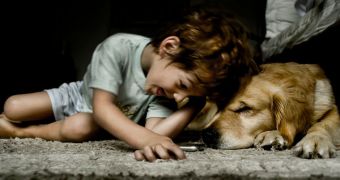Though many people are convinced before they have children that a newborn baby would not influence the way they take care of their pets, that is seldom the case.
According to a new investigation, it would appear that new parents oftentimes change their feelings and behaviors towards their pets, even if without noticing it.
The new data was derived from a research conducted on Montana cat and dog owners, which covered aspects such as the amount of time owners spent with their pets, the number of time the animals got medical care, and the type and number of activities they performed together.
“In all cases for dogs and cats, except for cats going to the vet, children adversely affected the animals,” explains Indiana University South Bend cultural sociologist David Blouin.
“People with children spent less time with their animals and took them to the vet less often,” adds Blouin, who was also a researcher on the new study.
The expert adds that the new work is far from accusing pet owners who become parents that they abuse, mistreat or neglect animals.
Rather, the goal of the research was to evidence the fact that most of us are influenced by our environments, when it comes to the way we view our pets.
Social context, Blouin explains, is everything in this situation, and the new study is therefore very important. Statistics show 60 percent of US households have at least one pet.
By and large, pet owners can be divided into three categories, the Indiana team believes, the Dominionists, the Humanists and the Protectionists.
People in the first category tend to see their pets as animal primarily, as useful instruments for carrying out certain tasks, and not as a being all onto itself.
Humanists, on the other hand, tend to see and report to their pets as if they were human beings, with equal rights and demands, LiveScience reports.
Thirdly, protectionists believe that pets are separate beings, which need protection from us at all times, and which need to be safeguarded against harm.
The team believes that, while it may be true new parents shift their attention from pets to kids, the humans always revert back to their cats and dogs after the children in question grow up.
In a survey they conducted, they learned that couples who had just had a son or daughter were less likely to consider their pet a baby, therefore shifting from a Humanist to a Dominionist view.

 14 DAY TRIAL //
14 DAY TRIAL //